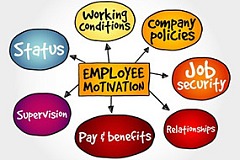 Providing feedback to employees plays an important role in the success of a business.
Providing feedback to employees plays an important role in the success of a business.
The feedback given by managers and received by employees can tell you a lot about the state of your business, the effectiveness of employees, and whether or not decision-makers can communicate effectively.
[quotes]Despite the importance of employee feedback, a lot of companies struggle with the right way to give it. [/quotes] But if you've come to learn more about giving feedback, you've come to the right place.
We're going to tell you everything you need to know about employee feedback. Once you read this post, you'll know
- When to give feedback,
- When not to give feedback, and
- The best way to give feedback to increase its effectiveness.
Feedback 101: Three Times to Always Give Feedback
One of the keys to being an effective manager is to know when your employees need feedback. Sometimes feedback can wait, and other times it's crucial for employee success.
Do you struggle with knowing if you're providing feedback to employees at the right time? Know that giving feedback is almost always a good idea in the following three situations.
1. Behavior Deserves to Be Recognized
Someone just successfully executed phase one of a long and important project. An employee has gone above and beyond their established duties. A resourceful team came together to solve a problem in the 11th hour.
[quotesright] It's important to give praise when praise is due. Never fail to give positive feedback in positive situations, especially if you can make it public. [/quotesright]
Positive feedback doesn't just help individual employees, it also boosts overall morale. Always give credit when it’s due and don't hesitate to praise employees that have accomplished something.
2. The Likelihood for Improvement is High
Learning opportunities for employees are some of the best situations to provide feedback, regardless of whether it's good or bad.
The main reason to give feedback is to engender improvement, whether that's on a personal employee level or a larger organizational level.
People aren't perfect and employees are going to make mistakes. When you see a teaching opportunity, never pass it up.
3. A Problem Cannot Be Ignored
One of the worst things you can do when a problem arises with an employee is to ignore it.
Ignoring problems is a signal to employees that you don’t want to help them, and that they shouldn't speak up when they notice that something is wrong. It could even be a sign that things aren't going well for your company overall.
[quotesright] If you refuse to acknowledge problems, good employees will start to leave, and problems at your business will get worse. [/quotesright] Don't try to avoid an uncomfortable situation, give feedback even if it won't be a fun conversation.
When to Not Give Feedback
There's a time and a place for everything, and occasionally you may feel that feedback needs to be given when it's actually best to wait or to hold your tongue entirely.
We've covered the right times to give feedback, now let's talk about times when you should avoid giving feedback.
1. You Don't Have All of the Information
Separating fact from fiction can be tough, but you need to get as close to the truth as possible before you provide feedback.
Talk to everyone involved in the incident you're commenting on, including the employee. Whether the incident you're commenting on was positive or negative, it's important to understand what truly happened.
2. You're Feeling Emotional
If you come off as overly harsh, exasperated, or annoyed, the employee may not be able to take your comments seriously. They'll write off your valid opinion as something that was said in the heat of the moment.
If the feedback can't wait until you're in the right headspace, lean on a manager or someone else in a supervisory role to say what needs to be said. Avoid being emotional when you're giving feedback of any kind.
3. You Don't Have Helpful Feedback
Regardless of whether it's positive or negative, giving feedback that doesn't give employees an actionable next step to follow should be avoided.
"I didn't like the way you handled that client call."
A statement like that may be true, but what actionable steps can an employee take from it? You didn't point out what they did wrong, or what they can do to improve and have a better experience next time.
"You handled that tough call really well. Great job!"
That feedback is nice, but it doesn't tell the employee much about what they did. You don't identify what they did well, or what you want them to include in the future.
Providing Feedback to Employees the Right Way
We've covered the right and wrong times to give feedback. Now we can focus on the important things to keep in mind when you're giving feedback.
Mastering the art of giving feedback to employees will help your business. [quotesright]Giving feedback can help you boost morale, discover and resolve important issues, and feel more connected to your employees. [/quotesright]
If you want to make it easy for employees to listen to your feedback and find ways to improve their effectiveness, remember to keep these tips in mind when you're talking to employees.
Open Up the Conversation
When you're giving feedback, you shouldn't just focus on making your point. You should also take the time to hear what your employee has to say about the situation.
Whether you're giving positive or negative feedback, be open to hearing your employee's opinions. Ask them what they think about the situation you're commenting on. Hear what they think of your feedback.
When you listen to an employee's opinion after giving feedback, you may learn that there are other people that deserve to be praised or acknowledged. [quotesright]You could find that their problems are the symptom of a larger problem. [/quotesright]
But if you don't listen to them, you won't be able to hear what they have to say. Letting employees respond can make them more receptive to your feedback and let them know that you find their opinions important.
Sometimes employees are open to admit to their shortcomings and ask for help or explain an important factor that made them make a certain decision.
Make Feedback Timely
Let's say than an employee did something that truly amazed you. They went above and beyond their job duties, and their team and the company greatly benefited from all of their hard work.
Or, maybe the opposite happened. An employee did something that was so bad that you're receiving emails from other employees about what they did. Your company stands to lose business, and the impact could be felt for years.
In either situation, why would you wait until their end-of-the-year review to talk to employees about what happened?
[quotesright]When you're giving feedback to employees, timeliness is key. If you wait too long, the incident in question will have passed and your feedback won't be as impactful. [/quotesright]
Don't wait weeks or months to give feedback, even if it's negative. Wait a day or two after the feedback-worthy event occurrs, then find the time to talk to your employee.
Watch Your Words and Tone
Out of the two following feedback scenarios, which one would you rather hear from your boss?
"Despite all of the time you spent on the project, you still screwed up the deliverable and wasted so many hours. I need to be involved in the next phase to make sure we don't upset the client again."
Or,
"You obviously put a lot of time into this despite the outcome. I have some suggestions around time management that may help during the next phase of the project. When is a good time for us to talk?"
Those two scenarios were worded very differently, but they still had the same basic message: the latest phase of a project went wrong and you need to get involved. But despite that similarity, one sounded much better than the other.
Sometimes it's not what you say, it's the way you say it. Body language and tone are important when you're communicating with people. And if you communicate the wrong way, you could end up with a strained relationship.
This is why it's important to take time to think about what you want to say. [quotesright]If you don't give extra time and attention to your words and tone, you may not convey the right message. [/quotesright]
Be Clear and Direct
When you're providing feedback to employees, don't leave anything to the imagination. Be clear about what you want to say and find the most effective and concise way to say what you need.
Don't say that you've noticed that they've been coming in late. Say that you're concerned about their chronic tardiness, and you're concerned that it'll hurt their performance and professional reputation.
When you're honest about what you want to say, you make it easier for employees to accept your feedback and find ways to act on it. You clearly outline your approach and give them a way to improve or continue on the right path.
Keep Improving
You now know the basics of providing feedback to employees. Giving feedback is an important part of running a successful business, but it's only one of many important things you can do.
Do you have other questions about how to best manage your employees? Are you curious about the latest growth strategies other businesses are using? Use the handy menu links at the top of the page to send your questions.














